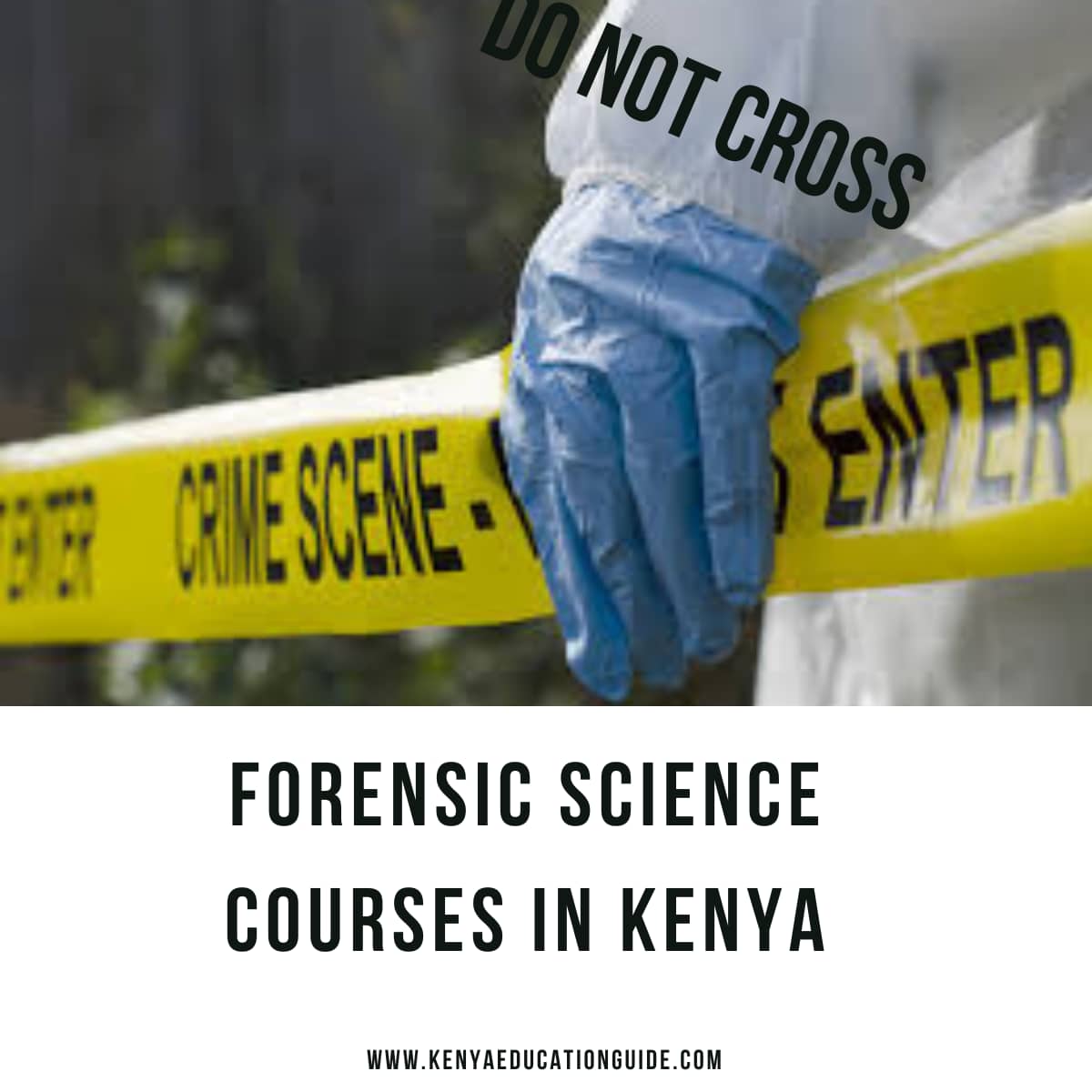Last updated on February 22nd, 2025 at 04:04 am
Learn everything about Forensic Science courses in Kenya in this article.
If you find injustice particularly troubling and have a strong interest in biology and chemistry, a career in forensic science will be a good fit for your interests and preferences.
As you might be aware, this is one of the best courses in Kenya and in the world at large.
So, if Forensic Sciences are of interest to you, here is everything you need to know about Forensic Science courses in Kenya.
Read on to the end to find out more.
Forensic science courses in Kenya (What the course is about, course requirements, career opportunities, and more)
What is Forensic Science Course in Kenya and what does it entail?
Forensic Science typically involves the application of science during a criminal investigation.
Needless to say, these investigations are primarily based on fingerprints, bloodstain pattern analysis, firearm investigation, hair analysis, DNA, and other analytical issues.
In other words, if you study Forensic Science, you will be equipped with the skills and knowledge needed to analyze and interpret physical evidence in various criminal cases.
Among the topics covered in a Forensic Science course are; DNA analysis, toxicology, fingerprint analysis, ballistics, and digital forensics.
As a forensic scientist, you will work in crime labs, examine vital evidence, and make the work of police investigators who are attempting to solve a case much easier.
Furthermore, this course will teach you how to gather, store, and analyze different types of evidence. You will spend a lot of time in a crime laboratory learning how to conduct proper and objective analysis and provide accurate results.
The results obtained are then used to identify a suspect or determine whether or not they committed a crime.
So, if you have a keen scientific mind and a keen eye for detail, you could use your abilities to help make the world a better place!
Where can you work with a Forensic Science qualification?
A Forensic Science program opens up a wide range of career opportunities in both the public and private sectors.
Remember that forensic science is the use of scientific techniques to solve crimes, identify evidence, and aid in legal proceedings.
That being so, some of the places you can work with a forensic science course qualification are as follows:
- Law enforcement agencies
- Crime laboratories
- Medical Examiner’s/Crime scene investigation offices
- Forensic anthropology
- Forensic odontology
- Forensic toxicology
- Forensic chemists
- Private consulting firms
- Academic and research institutions
- Government agencies
- Military and intelligence agencies
- Forensic Biology/DNA analysis
With that in mind, some of the positions you could hold are:
- Forensic Scientist (DNA Analyst, Toxicologist, Trace Evidence Analyst)
- Crime Scene Investigator (CSI)
- Forensic Pathologist
- Digital Forensic Analyst
- Forensic Anthropologist
- Forensic Odontologist
- Forensic Psychologist
- Crime Analyst
- Forensic Entomologist
TIME OUT
Hey there! Are you looking for the best courses, top colleges and universities, career guidance, and exciting scholarship opportunities in Kenya? Look no further! Join our Facebook page to stay up-to-date with all the latest information and insights on these topics.
So Please follow Kenya Education Guide on Facebook here for more updates about best courses in Kenya, best colleges and Universities in Kenya, Career choice options, Scholarships in Kenya, etc
Thanks.
Now proceed reading below..
Is Forensic Science marketable in Kenya?
Yes, forensic science is a viable career option in Kenya.
This field has grown in popularity as people become more aware of its significance in criminal investigations and legal proceedings.
Forensic scientists play an important role in investigations, crime prevention, and justice.
As a result, skilled Forensic Scientists are in high demand, making Forensic Science a potentially lucrative and marketable career path in the country.
Requirements for Forensic Science courses in Kenya
Forensic science courses are available at the certificate, diploma, and degree levels.
The following are their minimum entry requirements and where you can study at each level:
Certificate in Forensic Investigation
Minimum entry requirements: KCSE D (plain)
Course duration: 12 months (1 year)
Examination body: CDACCA
Where to study:
- College of Human Resource Management. The course is offered by the College of Human Resource Management in collaboration with the Institute of Certified Safety and Security Professionals of Kenya, an independent body for security professional career development in Kenya.
- Kenya Institute of Security and Criminal Justice
Diploma in Forensic Science requirements
Minimum entry requirements in Kenyatta University:
- KCSE mean grade of at least C (Plain) with a C+ (plus) in Biology and Chemistry, and a C (Plain) in Mathematics/Physics
OR,
- Have served in the disciplined forces for a minimum of two (2) years with experience in any Forensic Science discipline.
OR,
- Have a Certificate in Forensic Science with a minimum KCSE mean grade C- (Minus) or equivalent.
Course duration: 2 years
Examination body: CDACCA/KNEC
Where to study:
- Kenyatta University
- Kenya Institute of Security and Criminal Justice
- College of Human Resource Management
Bachelor in Science in Forensic Science requirements
Minimum entry requirements:
KCSE mean grade of C+ (plus)
Minimum cluster subjects requirements:
- Mathematics C (plain)
- Biology C+ (plus)
- Chemistry C (plain)
Course duration: 4 years
Examination body: KNEC
Where to study:
- Kenyatta University
- Kirinyaga University
Wrap up
So, that’s all there is to know about Forensic Science courses in Kenya.
Forensic Science is a lucrative career path with numerous job opportunities.
So, make your decision today!
Good luck!

